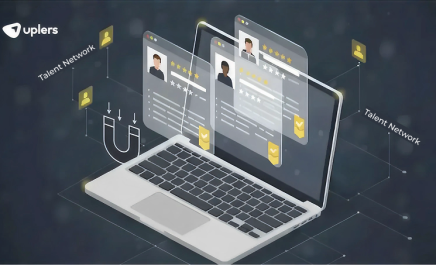How Kotlin Developers Help SaaS Companies Build Secure and Scalable Apps in 2025
- Shachi Dixit
- June 6, 2025
- 5 Minute Read

In 2025, the SaaS industry is expected to grow exponentially worldwide, with FinTech, HealthTech and EdTech driving adoption.
With 72% of business organizations focusing on cloud-native applications, the need for reliable and scalable programming languages has grown.
Kotlin, originally known as Android development, now dominates backend systems with its compact syntax, Java compatibility, and strong tooling.
This article explores why SaaS companies should hire Kotlin developers in 2025 to tackle modern challenges like regulatory compliance, security threats, and scalability demands. Read on!
Why Kotlin Is Gaining Popularity Among SaaS Companies

Kotlin’s adoption took off after JetBrains reported a 40% reduction in boilerplate code over Java.
Its smooth interaction with Java makes it easier for companies to upgrade legacy systems without interrupting workflows—a key benefit for SaaS businesses operating hybrid architectures.
Google’s support has further boosted Kotlin Multiplatform adoption, making it easier to achieve scalable SaaS with Kotlin using shared codebases on iOS, Android, and web platforms.
For instance, 30% of time can be saved on development due to the use of Kotlin Multiplatform. Also, surveys highlight that SaaS developers are increasingly using Kotlin due to its new syntax and tools-friendly approach, e.g., IntelliJ IDEA’s powerful debugging feature.
Also, Kotlin’s increasing library ecosystem that consists of Koin for dependency injection makes complicated workflows easier; that’s why startups prefer it as well as big companies.
The Role of Kotlin Developers in Building SaaS Applications
Companies focusing on hiring Kotlin developers in 2025 have a competitive advantage in creating flexible, future-proof SaaS solutions.
Cloud-Native Backend Development
Kotlin developer roles involve building strong backend architecture through frameworks such as Spring Boot and Ktor. They make the code efficient by leveraging Kotlin’s brief syntax and coroutines, which allows SaaS platforms to deal with high concurrency and real-time requirements without problems.
Cross-Platform Logic
Mastery of Kotlin developer skills like Kotlin Multiplatform for cross-platform logic sharing, Koin for dependency injection, and cloud-native tool integration is crucial. These skills make workflows efficient, eliminate redundancy, and maintain compliance in regulated sectors like FinTech and HealthTech.
Performance Optimisation
Kotlin engineers are masters at deploying microservices using Kubernetes, Docker, and cloud platforms (AWS, GCP). Their skill in mapping SaaS applications to DevOps practices guarantees scalability, resilience, and quick iteration—essential characteristics for success in 2025’s cloud-first environment.
Also Read: Hiring a WordPress Developer: Do’s and Dont’s
Security Advantages of Kotlin for SaaS Development
Kotlin also offers some built-in security features that make it perfect for SaaS applications:
Null Safety Minimizing Runtime Crashes
Kotlin’s null safety capability actively reduces runtime crashes by enforcing explicit null checks, a significant benefit for Hiring Kotlin developers in 2025 to develop robust SaaS applications.
Strong Typing System Increasing Code Reliability
The language’s strict type system minimizes logical errors and provides predictable behavior—essential for Kotlin developers’ roles, which concentrate on maintaining secure, audit-ready SaaS platforms.

Secure Integration Patterns
Kotlin developers use industry-standard protocols such as OAuth and OpenID Connect to secure user authentication, keeping SaaS systems in line with current security requirements.
Support for Modern Security Frameworks
By using frameworks such as Spring Security and JWT, Kotlin developers achieve compliance and data integrity, making them a necessity for SaaS teams that focus on a secure, scalable architecture.
Building Scalable Architectures With Kotlin
Kotlin enables developers to build systems that scale with ease, even in the face of modern SaaS workload demands.
Here’s how:
- Reactive Programming for Asynchronous Workflows: Kotlin Coroutines and Flow make difficult asynchronous jobs easier, with non-blocking functions that improve responsiveness in high-traffic SaaS applications.
- Microservices Architecture Support: Spring Boot and Ktor frameworks allow developers to implement modular, lightweight microservices, easing maintenance and rapid iteration in distributed systems.
- Optimized Memory and Thread Management: Kotlin’s lean concurrency model and lightweight coroutines maximize resource efficiency, minimizing overhead in multi-threaded scenarios for scalable performance.
- Cloud-Native Scalability Integration: With smooth integration with tools such as Firebase and AWS Lambda, Kotlin provides support for auto-scaling, serverless processes, and real-time data processing—all essential features of dynamic SaaS environments.
Best Practices for Kotlin SaaS Development in 2025

Embracing new tools and rigorous coding practices is central to keeping robust, future-proof SaaS platforms.
Here are some practices to follow in this regard:
- Embrace Kotlin DSLs: Apply Gradle Kotlin DSL for Infrastructure-as-Code (IaC) to automate deployments and minimise human errors.
- Enforce Code Quality: Detekt and Ktlint detect code early—a vital Kotlin developer skill for sustaining long-term projects.
- CI/CD Pipelines: Run Kotlin scripts in Jenkins or GitLab CI, reducing build times by 25% and speeding up time-to-market.
- Modular Architecture: Divide monolithic systems into microservices with Ktor to enhance scalability and support agile team operations.
These strategies ensure that scalable SaaS with Kotlin is still easy to maintain and flexible enough to accommodate future changes in technology.
Real-World Use Cases
Kotlin’s versatility shines in actual implementations, fueling mission-critical solutions for SaaS innovators and regulated businesses.
From making backend processes easy to enable cross-platform agility, here’s how global innovators tap into its power:
SaaS Companies Leveraging Kotlin Successfully
Trello, Evernote, and Netflix use Kotlin because it simplifies backend development as well as ensures cross-platform usage.
Industry Verticals Benefiting the Most
FinTech: Kotlin’s security capabilities and compliance-ready architecture facilitate secure transaction systems. For example, American Express uses Kotlin delegates to develop secure Android apps, improving property management and code maintainability.
EdTech
Cross-platform flexibility allows for easy learning tools across devices. For example, Khan Academy has developed its Android app completely in Kotlin, supporting offline learning modules and interactive coding exercises.
HealthTech
Stability and real-time data processing guarantee strong patient management platforms. For example, Philips employs KMP in its HealthSuite Digital Platform mobile SDK.
These instances prove the advantages of hiring Kotlin developers, especially for SaaS firms aiming for fast growth and high compliance requirements.
Future Outlook: Kotlin and SaaS in the Coming Years
The compiler enhancements of Kotlin will decrease app binary sizes, boosting performance for IoT-based SaaS applications.
Growth of Kotlin Multiplatform within enterprise SaaS will facilitate reuse of code across frontend and backend, reducing development expenses.
Furthermore, Kotlin integration with AI libraries such as TensorFlow Lite will empower predictive functionalities, including customized learning pathways in EdTech apps and fraud detection mechanisms in FinTech.
Some other emerging trends include Kotlin’s growing adoption in quantum computing frameworks, with businesses such as IBM trying out Kotlin-native quantum algorithms for real-time data encryption.
Such developments place Kotlin at the center of next-gen SaaS architectures, underscoring the advantages of hiring Kotlin developer teams to harness advanced tools and future-proof applications.
Also Read: How to Source and Hire Vue.js Developers with the Right Experience
To Wrap Up
By enhancing security, scalability, and affordability, hiring Kotlin developers in 2025 provides SaaS businesses with a competitive advantage.
Kotlin tackles contemporary development issues head-on, from null-pointer error elimination to cross-platform synergy enablement. As the ecosystem evolves, Kotlin’s role in AI, IoT, and quantum-powered SaaS applications will establish itself as an industry pillar.
With Uplers, you can connect with top-tier Kotlin developers who are equipped to handle the demands of building secure, scalable, and future-proof SaaS applications. Contact us for more details!
Frequently Asked Questions
Why is Kotlin an appropriate choice for SaaS development?
Ans: In agile SaaS cultures, Kotlin’s null safety, Java interoperability, and minimalistic syntax decrease bugs and speed up development.
Is Kotlin superior to Java or Python for SaaS backends?
Ans: Kotlin beats Python in high-concurrency environments and decreases code size compared to Java, making code more maintainable.
Can Kotlin be applied to both frontend and backend development?
Ans: Yes. Kotlin multiplatform facilitates sharing business logic between Android, iOS, and web front ends and Ktor or Spring Boot-based backends.
How does Kotlin enhance SaaS app security?
Ans: Null safety, strong type checking, and OAuth2/JWT integration counter threats, conforming to GDPR and ISO 27001.
Are there any drawbacks to using Kotlin for SaaS?
Ans: Kotlin is more challenging to learn than Python, but its scalability and reduced debugging time make it worth the investment in the long run.






